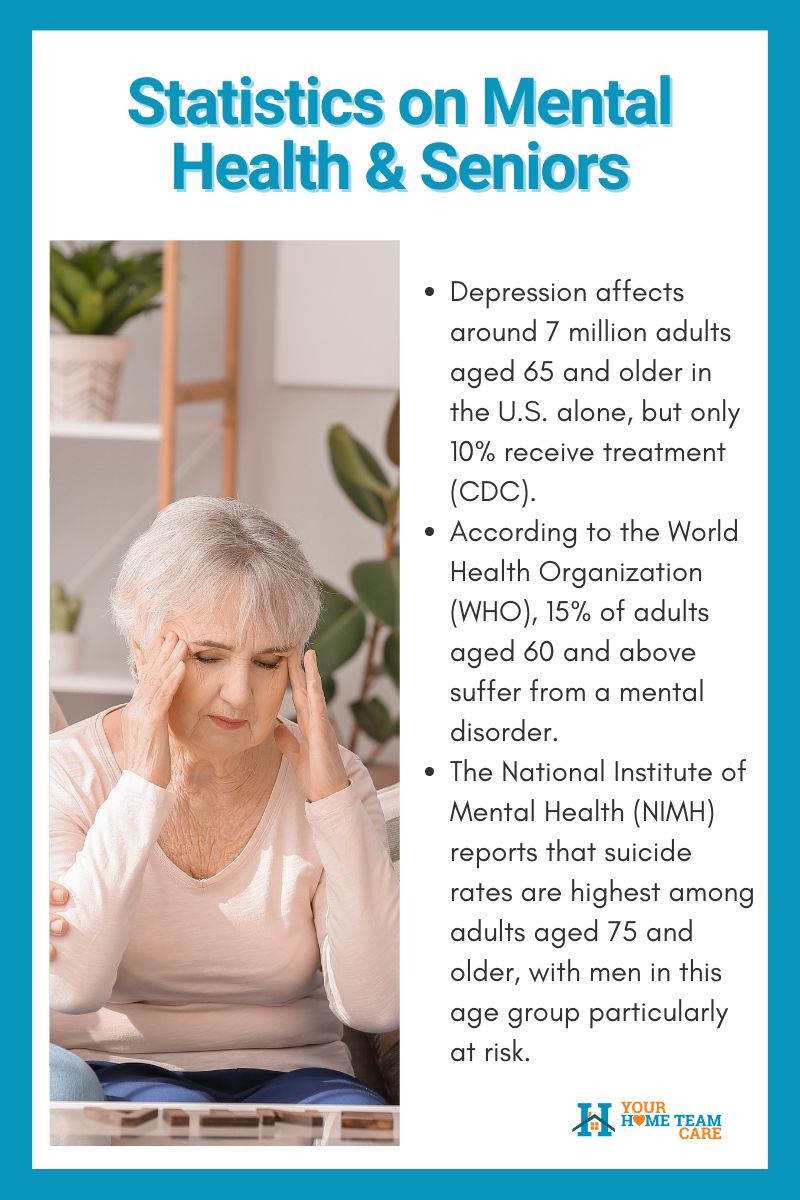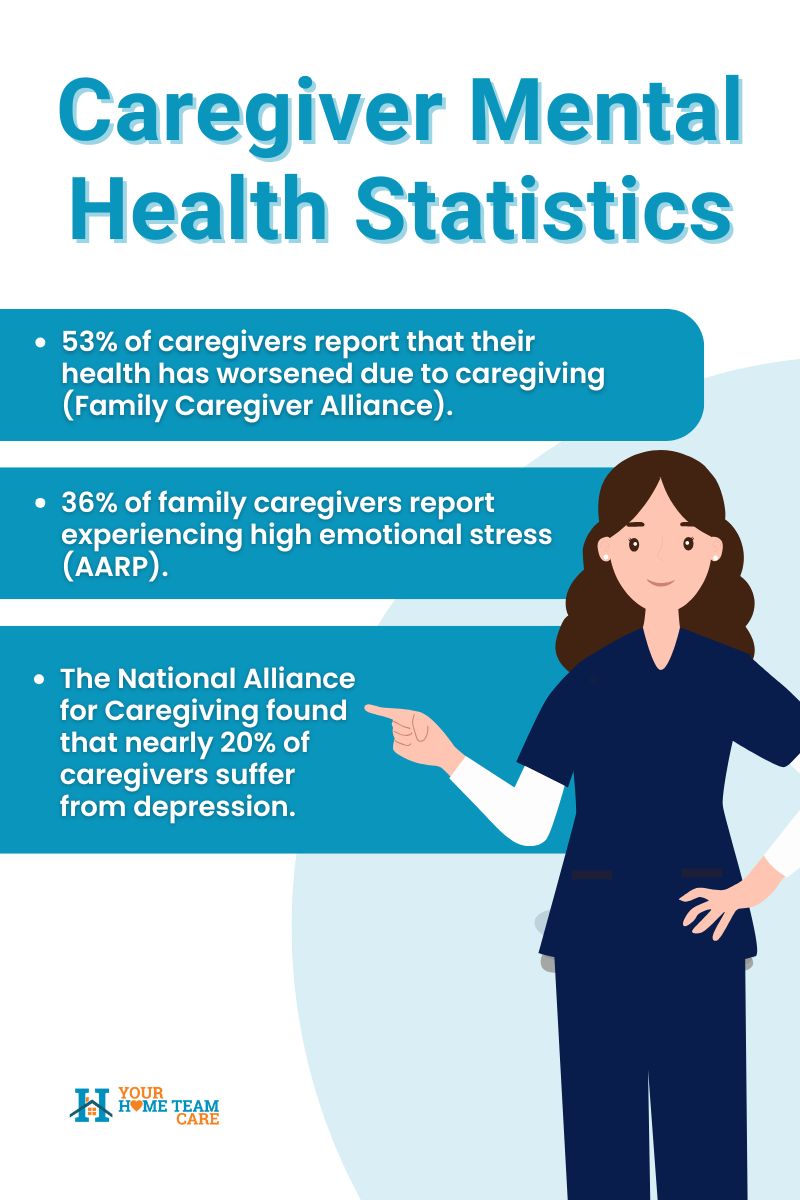Mental health awareness is crucial at any stage of life, but for seniors and their caregivers, it takes on a heightened significance. As we age, physical and emotional challenges can put a strain on mental well-being, and caregiving—while rewarding—comes with its own set of stresses. Unfortunately, mental health issues among seniors and caregivers often go unnoticed or are mistaken for the normal aging process. In this blog post, we’ll explore the importance of mental health awareness for seniors and caregivers, provide key statistics, actionable tips, and helpful resources to maintain mental well-being.
The Importance of Mental Health in Seniors
As seniors transition into later stages of life, they face several changes—retirement, loss of loved ones, declining health, and increased isolation—that can lead to mental health struggles. Depression, anxiety, and cognitive decline are common, yet often untreated.

Common Mental Health Challenges for Seniors
- Depression: Often dismissed as “feeling down” due to aging, depression in seniors can go untreated, exacerbating other health issues.
- Anxiety: Seniors may experience heightened worry due to physical ailments, loss of independence, or financial concerns.
- Cognitive Decline: Conditions like Alzheimer’s disease and other forms of dementia can have a profound effect on mental health.
- Loneliness: Isolation and loneliness are significant contributors to poor mental health, especially for seniors who live alone.

Caregivers are often the unsung heroes, providing emotional and physical support for their aging loved ones. However, this noble role can lead to high levels of stress, anxiety, and even burnout.
Common Mental Health Challenges for Caregivers
- Caregiver Burnout: Prolonged stress and overwhelming responsibilities can lead to emotional and physical exhaustion.
- Compassion Fatigue: Constantly caring for another person without adequate support or rest can cause caregivers to feel detached or emotionally numb.
- Anxiety and Stress: Worrying about a loved one’s health, finances, or future can lead to chronic anxiety.
- Guilt: Caregivers often feel guilty for taking time for themselves or not being able to provide “perfect” care, further fueling stress.
Mental Health Tips for Seniors
- Stay Socially Active: Regular social interaction is key to maintaining mental well-being. Seniors can join community groups, attend senior centers, or participate in activities that encourage social engagement.
- Physical Exercise: Exercise doesn’t just improve physical health—it boosts mood and cognitive function. Simple activities like walking, stretching, or swimming can make a big difference.
- Mindfulness and Meditation: Practices like mindfulness, meditation, or breathing exercises can help seniors reduce stress and anxiety.
- Healthy Diet: A balanced diet rich in fruits, vegetables, and omega-3 fatty acids supports both brain and body health. Certain vitamins, like Vitamin D and B12, can help combat depression and cognitive decline.
- Seek Professional Help: It’s crucial for seniors to have regular check-ins with mental health professionals. Therapy, counseling, or even medications (if recommended by a healthcare provider) can be highly effective in managing mental health issues.
Mental Health Tips for Caregivers
- Take Breaks: Schedule regular breaks throughout the day, even if it’s just 10 minutes of quiet time. Consider respite care services, where a professional can step in temporarily to provide care.
- Set Boundaries: Establish clear boundaries with your loved one to ensure that caregiving responsibilities don’t overwhelm you.
- Stay Connected: Join a caregiver support group, either in-person or online, to share experiences and receive emotional support.
- Practice Self-Care: Make time for hobbies, exercise, and relaxation. Regular physical activity and healthy eating are essential for managing stress.
- Seek Professional Support: Don’t hesitate to speak with a mental health professional. Therapy can provide caregivers with coping strategies and a space to express their feelings.
Online Resources for Mental Health Support
Both seniors and caregivers can benefit from exploring online mental health resources. Here are a few trusted organizations:
- National Institute of Mental Health (NIMH): www.nimh.nih.gov
- National Alliance on Mental Illness (NAMI): www.nami.org
- Family Caregiver Alliance: www.caregiver.org
These resources offer a wealth of information and guidance for managing mental health challenges.
Mental health awareness is essential for both seniors and their caregivers. Addressing mental health is not a sign of weakness but of strength, resilience, and self-care. For seniors, this could mean engaging in community activities or seeking professional counseling. For caregivers, it could involve taking breaks, joining support groups, or pursuing therapy to cope with the emotional toll.
If you’re caring for a loved one and need assistance, consider Your Home Team Care’s services. We offer respite care, in-home assistance, and support for both seniors and caregivers. Our team is here to provide a free in-home consultation to assess your needs and ensure that both you and your loved one receive the care and support you deserve.
Final Thoughts
Mental health is a crucial aspect of overall well-being, especially for seniors and their caregivers. By raising awareness, seeking support, and implementing healthy practices, we can create a supportive environment that fosters mental wellness. Remember, caring for mental health is just as important as physical health.
For more information about our services, contact us today at 865-332-5000.

